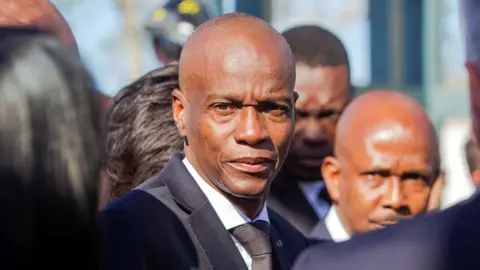
Haiti
It is presidential private residence. It’s 1 am. Four commandos storm in armed to the teeth shouting, “we are DEA(Drug Enforcement Agency) operation. Everybody stand down. DEA operation.” They appear legit since they speak French and English. Suddenly shooting ensued. Right into presidential bedroom. They shoot the president 12 times on the forehead, chest, abdomen and hips ripping him apart. He’s left lying on his back with blue pants in a pool of blood, his white shirt smeared with blood, his mouth open, his left eye gouged out. Terrified President’s daughter hides in her bedroom as they ransack President’s office and rooms, firing machine guns. A maid and another servant are then tied up by the gunmen. First Lady is shot through the legs, arm, torso and hand. Then immediately they flee. This is not a Hollywood blockbuster but how Haitian President Jovenel Moise was killed in a cold blood in the capital Port au Prince. The First Lady was later airlifted to Florida, US where she is now stable.
The assassination came amid political turmoil in Haiti with opponents of Mr Moise trying to force him from office, claiming his five-year term has expired. Mr Moise said back in February that he survived another assassination attempt, describing it as ‘a coup’. At least 23 people, including a top judge and police official, were arrested. Haitian Prime Minister Mr Joseph, who is now in charge on interim basis, has now declared a two-week ‘state of siege’ imposing martial law, halting all flights out of Port-Au-Prince and sealing the country’s borders, while neighboring Dominican Republic mobilized its military to guard Haiti’s only land border. Haiti, a French speaking nation with a population of 11M, has never been stable with leaders siphoning its economy through rampant corruption. Haiti was ranked 161 from 180 countries in Transparency International’s 2018 global survey of corruption.
The increasingly dire situation comes as Haiti is still trying to recover from the devastating 2010 earthquake and Hurricane Matthew in 2016 following a history of dictatorship and political upheaval. Haiti had grown increasingly unstable under Moïse, who had been ruling by decree for more than a year and faced violent protests as critics accused him of trying to amass more power while the opposition demanded he step down. According to Haiti’s constitution, Moïse should be replaced by the president of Haiti’s Supreme Court, but the chief justice died in recent days from COVID-19, leaving open the question of who might rightfully succeed to the office.
Joseph, meanwhile, was supposed to be replaced by Ariel Henry, who had been named prime minister by Moïse a day before the assassination. Haiti gained independence from colonial France after an uprising by slaves in 1804. However, democracy has never been here & only held its first free elections in 1990.
ALSO READ: Tapping Into Top Journalists
History of Haiti goes back to 1804 after a long and bloody revolution by slaves and free people of color against the French. It has suffered a turbulent history ever since. Since it’s independence, Haiti, a tiny island in Carribean that borders Dominica Republic, has suffered trails of dictatorship rule. Its most notorious leaders were the father and son dictators Pap Doc and Baby Doc, who ruled for three decades that saw an estimated 90,000 people die. Francois Duvalier – who was known Papa Doc for his previous career as a medical doctor – came to power as president in 1957 on a populist and black nationalist platform. He survived a military coup the following year and his regime became one of the most repressive in the Western hemisphere, relying on its death squad, the Tonton Macoute, to kill opponents. Duvalier died in 1971, passing on the presidency to his chubby 19 yr old son Jean-Claude or Baby Doc. He continued with oppressive regime





